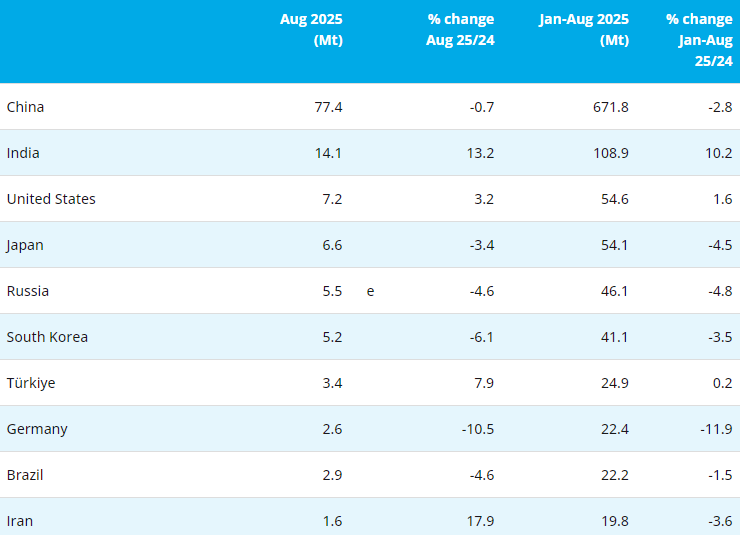[Ferro-Alloys.com] In June, Toyota’s leadership took to the stage at the carmaker’s research facility near Mount Fuji and spelt out a detailed battery strategy — one that could help it achieve a goal of selling 3.5mn electric vehicles by 2030. The preview even included plans to commercialise solid-state battery technology in an EV as soon as 2027.
But these bold ambitions — from a company that sold just 38,000 electric vehicles in the last financial year — only underscore the challenges that Toyota, and corporate Japan, face in ramping up their EV targets as the world seeks a more sustainable way to produce car batteries.
That is because Japan’s renewed push into EVs coincides with intensified efforts on the part of the US and its allies to reduce their reliance on China for critical supplies — including battery materials.
China currently controls large parts of the EV and battery supply chain, producing 68 per cent of the world’s cathodes and nearly 90 per cent of its anodes, according to the International Energy Agency. The OECD estimates that the country alone exported one-third of the world’s lithium ion batteries in 2017, and 38 per cent of them in 20
And that supply cannot be taken for granted. In 2010, China embargoed the export of rare earths, serving a wake-up call to Japanese policymakers, who have since worked to reduce the country’s reliance on China for the production of cobalt and nickel. However, China still accounts for a large portion of the smelting of these metals.
“We can’t possibly decouple from China but we can at least de-risk by gradually reducing our reliance,” explains one senior Japanese government official.
In May, Panasonic chief executive Yuki Kusumi told journalists that the electronics group would seek to reduce its reliance on China by diversifying its supply chain to other countries, such as Canada.
“We don’t think the transport of battery materials from China to the US will be halted immediately . . . but, as long as the risk exists, we will need to ensure supply chains outside of China,” he said.
Japan’s Ministry for Economy, Trade and Industry expects domestic lithium-ion battery production capacity to reach 150 GWh a year by 2030, compared with roughly 20 GWh/yr currently.
However, to achieve that goal, Japan needs to secure 100,000 tonnes of lithium a year, 90,000 tonnes of nickel, 150,000 tonnes of graphite, 20,000 tonnes of cobalt, and 20,000 tonnes of manganese, according to data provider Argus Media.
Japan lacks its own rare earth deposits so it will have to rely on imports by building partnerships with other countries. Some companies, however, like Panasonic, have also developed the technology to produce cobalt-free batteries and are now working on reducing the use of nickel.
At the G7 climate minister meeting in Sapporo in April, Tokyo called on like-minded countries to work together to develop new mines and supply chains and recycle critical minerals.
“Japan now considers recycling critical minerals as an important economic issue that is hugely important for economic security,” says Yusuke Maekawa, a senior analyst with Argus Media. “That policy was adopted by the G7 . . . this is how serious they are about recycling.”
Panasonic aims to use recycled materials for one-third of its battery components. But it will be a long time before battery recycling reaches the volumes required to have a significant impact.
Professor Toru Okabe at Tokyo University’s Institute of Industrial Science says that the cost of environmentally sound recycling is simply so high, compared with the cost of extracting rare earths from ore in countries with comparatively low regulation, that the “percentage of rare earths recycled is less than 10 per cent”.
Supply of used batteries is another issue. Hans Eric Melin, managing director of Circular Energy Storage, a consultancy, says: “Anyone can start a recycling operation, but what do you actually need? Well, first of all, they need feedstock. And that is something that Japan does not have.”
Batteries in home-produced vehicles end up elsewhere, Melin notes. “It’s not only that they are not a big producer of batteries for electric vehicles but . . . they are a huge exporter of used vehicles and not least electric vehicles, if you look at the immense amount of used Nissan Leaf [EVs] from Japan that today are travelling on New Zealand roads, in Russia and in Kenya.”
Japanese companies do recognise that fact. Last year, Nissan announced plans to lease its electric vehicles, rather than sell them, in order to keep metals within the country, while Toyota also started offering a subscription service for its first mass-produced EV.
But, even if issues of cost and supply of used batteries can be solved, Okabe says the simple fact remains that rising demand for EVs and consumer electronics will outstrip any increase in the amount of materials that can be extracted by recycling. As long as the former is growing, the latter cannot catch up.
That means Japan must make some tough decisions, and continue to invest in disruptive technologies, even if, as Okabe suggests, pragmatism will be required to manage near-term demand. “You have to retain good relations with China,” he says. “That’s going to be the one best solution.”
- [Editor:tianyawei]



 Save
Save Print
Print Daily News
Daily News Research
Research Magazine
Magazine Company Database
Company Database Customized Database
Customized Database Conferences
Conferences Advertisement
Advertisement Trade
Trade

















Tell Us What You Think